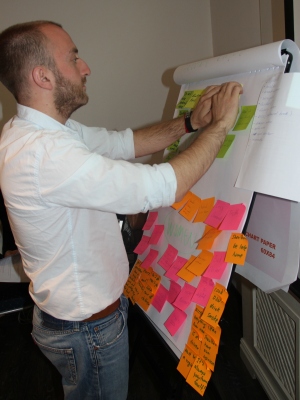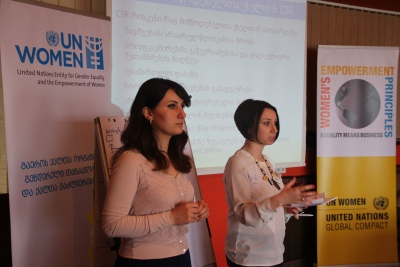Engaging the private sector to achieve gender equality
Date:
The private sector is the largest employment sector in Georgia, and private businesses can play a crucial role to promote gender equality. To boost private sector engagement for the empowerment of women inside and outside of companies, UN Women in Georgia conducted two trainings in April on the Women’s Empowerment Principles (WEPs) for 30 business representatives, in collaboration with the Georgian Microfinance Association and the International Chamber of Commerce (ICC) in Georgia.

UN Women in Georgia conducted two trainings on the Women's Empowerment Principles(WEPs) for business representatives; Photo: UN Women
The trainings on gender equality and women’s empowerment delivered by UN Women in Georgia are based on the WEPs (jointly developed by UN Women and UN Global Compact). One of the first groups to participate in UN Women’s WEPs-based training was the Georgian Microfinance Association, representing 20 microfinance institutions. The training functions as a follow-up to a 2013 study conducted by UN Women in Georgia with some of the Association’s members that analysed the accessibility of financial services for women. Iuri Lebanidze, Executive Director of the Association, explains why they organized the WEPs training for their members: “Gender equality is an important issue all over the world. For our members, it is a priority and we have included reference to the Women’s Empowerment Principles in our Code of Conduct. We see this training as part of our implementation of this Code.”

UN Women in Georgia conducted two trainings on the Women's Empowerment Principles(WEPs) for business representatives; Photo: UN Women
The training for the Georgian Microfinance Association took place on 27 April and included 14 participants – CEOs, financial directors, and administrative and HR managers, among others – from microfinance institutions such as FINCA Bank, MFO BIG and MFO Creditplus. Sixteen participants – including CEOs and PR and external affairs managers from companies such as PricewaterhouseCoopers, KPMG and GM Investment Group – engaged in the training organized with ICC on 25 April.